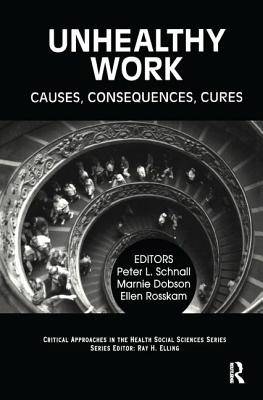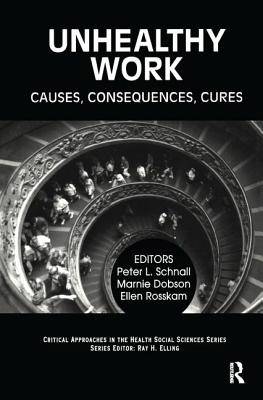
- Retrait gratuit dans votre magasin Club
- 7.000.000 titres dans notre catalogue
- Payer en toute sécurité
- Toujours un magasin près de chez vous
- Retrait gratuit dans votre magasin Club
- 7.000.0000 titres dans notre catalogue
- Payer en toute sécurité
- Toujours un magasin près de chez vous
236,95 €
+ 473 points
Format
Description
Work, so fundamental to well-being, has its darker and more costly side. Work can adversely affect our health, well beyond the usual counts of injuries that we think of as 'occupational health'. The ways in which work is organized - its pace and intensity, degree of control over the work process, sense of justice, and employment security, among other things - can be as toxic to the health of workers as the chemicals in the air. These work characteristics can be detrimental not only to mental well-being but to physical health. Scientists refer to these features of work as 'hazards' of the 'psychosocial' work environment. One key pathway from the work environment to illness is through the mechanism of stress; thus we speak of 'stressors' in the work environment, or 'work stress'. This is in contrast to the popular psychological understandings of 'stress', which locate many of the problems with the individual rather than the environment. In this book we advance a social environmental understanding of the workplace and health. The book addresses this topic in three parts: the important changes taking place in the world of work in the context of the global economy (Part I); scientific findings on the effects of particular forms of work organization and work stressors on employees' health, 'unhealthy work' as a major public health problem, and estimates of costs to employers and society (Part II); and, case studies and various approaches to improve working conditions, prevent disease, and improve health (Part III).
Spécifications
Parties prenantes
- Auteur(s) :
- Editeur:
Contenu
- Nombre de pages :
- 380
- Langue:
- Anglais
- Collection :
Caractéristiques
- EAN:
- 9780895033352
- Date de parution :
- 15-09-09
- Format:
- Livre relié
- Format numérique:
- Genaaid
- Dimensions :
- 152 mm x 229 mm
- Poids :
- 869 g

Les avis
Nous publions uniquement les avis qui respectent les conditions requises. Consultez nos conditions pour les avis.






